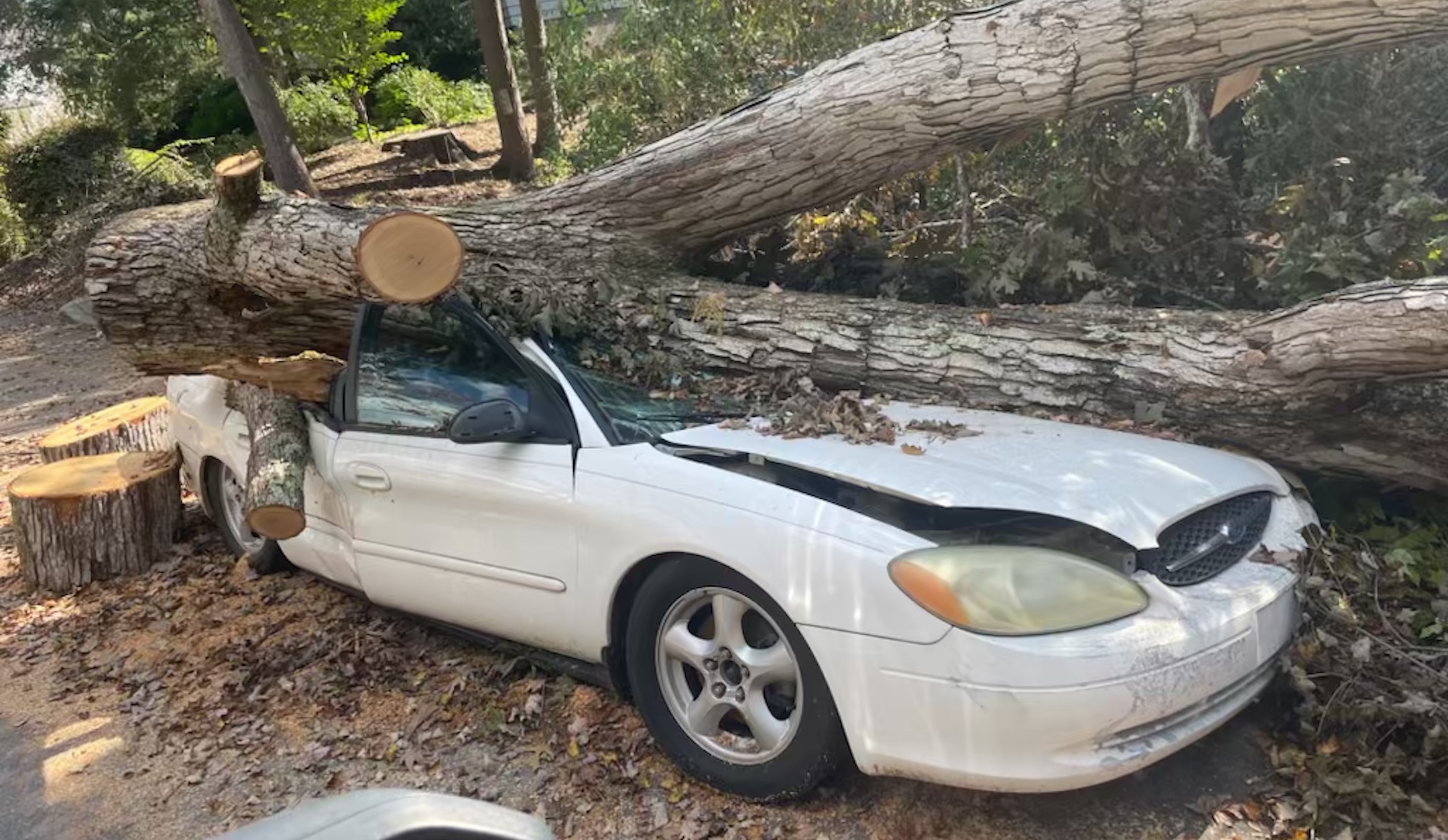Building a sukkah doesn’t make sense this year in Asheville. But we can see the stars already.
Many people in Asheville are living in temporary dwellings out of necessity after Hurricane Helene

Cars and houses in Asheville, North Carolina, had trees fall on them during Hurricane Helene in September 2024. (Joanie Terrizzi)
(JTA) — ASHEVILLE, North Carolina — My backyard is perfect for a sukkah. I can walk right off the deck into my yard, which is surrounded by my garden and the autumnal woods. There is easy access to the kitchen and to the stars.
Last year, my first in my new home here in this beautiful mountain town, I was away for much of the weeklong Sukkot holiday helping someone I care about who needed me. So I was excited to buy the building materials and make use of my space for the first time this fall.
After Hurricane Helene pummeled my city, I’m not doing it.
I am not building a sukkah this year because I just spent two weeks cooking and eating every meal outside. It was hard and frustrating, and while I recognize that I’m so, so, so much more fortunate than people even a few blocks away from me, it feels a little triggering right now to access the symbology for the very real thing I just did.
I am not building a sukkah this year because I couldn’t possibly go buy building materials for a temporary, symbolic dwelling when people desperately need those building materials to repair their actual homes to have more than two and a half walls, to keep the night air out, to make them livable, or to build non-symbolic temporary structures where their homes used to be. Temperatures are supposed to dip to freezing tonight. This is a matter of pikuach nefesh (the Jewish commandment to preserve life above all else) — how dare I buy building materials that I personally don’t need when others very much do?
I am not building a sukkah this year, because I don’t need the symbology of the cloud of glory, the temporal, human vulnerability, or the sense that we are cared for by something mysterious that is greater than us. All I need to do is walk out of my house still feeling deeply vulnerable and I will trip over the most beautiful, gracious, unbelievable sense of being deeply cared for by something far greater than individual human capacity: community. It is a glorious thing: Every human I’ve encountered is walking with a grace bigger than the human heart. I don’t need a symbolic reminder for something I am face-to-face with, constantly.
I am not building a sukkah this year because schach (branches from trees used as the roof on a sukkah) is everywhere. Thousands and thousands of tree branches line the roads everywhere I drive, and some peoples’ actual homes are still covered by schach rather than roof. I don’t need to be reminded how vulnerable we are, how temporary this is, how you can see the stars between the branches on the sukkah roof — when you can see the stars between the branches in the zombie-hero-survivors’ eyes all around me.
There would be no joy in building what I do not need.
Maybe next year, when all are housed and warm and our feet have hit the ground and our minds have rested, maybe then I will gladden my heart in a symbolic structure. Instead, I am thinking of all I know who live in towns that are not broken and who will sit around tables together creating memories and enjoying links in paper chains and chains of tradition, and my heart shares in a wisp of their joy.
But here in Asheville, I will continue to rally these weary bones, to do what I can to be part of the grace bigger than myself and to show my neighbors that caring humans are showing up for them in their very non-symbolic, deeply vulnerable season.
The views and opinions expressed in this article are those of the author and do not necessarily reflect the views of JTA or its parent company, 70 Faces Media.
A message from our CEO & publisher Rachel Fishman Feddersen
I hope you appreciated this article. Before you go, I’d like to ask you to please support the Forward’s award-winning, nonprofit journalism during this critical time.
We’ve set a goal to raise $260,000 by December 31. That’s an ambitious goal, but one that will give us the resources we need to invest in the high quality news, opinion, analysis and cultural coverage that isn’t available anywhere else.
If you feel inspired to make an impact, now is the time to give something back. Join us as a member at your most generous level.
— Rachel Fishman Feddersen, Publisher and CEO